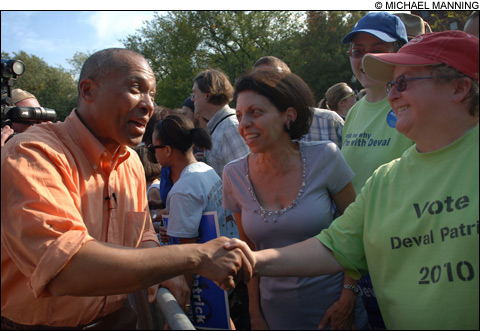It's easy to imagine how this could work very effectively — for example, on those two women from Dorchester. They may be willing to listen if someone from their neighborhood, or workplace, or church, wants to talk to them about the administration's accomplishments, which may very likely convince them that Patrick does deserve re-election after all. The ongoing contact, and personal reminders, may make it more likely that they actually vote.
But a lot of veteran Democratic organizers in the area are highly skeptical, to say the least. They believe that these volunteer coordinators, however well-intentioned, will find it much harder to get pledges than they expect — and will get discouraged, and drop out of the effort. That's going to lead to huge gaps in identified voters, and a disastrous get-out-the-vote effort. (Some of these skeptics work on other Democratic campaigns in the state, and fear that their own fates are now tied to this unconventional strategy.)
The campaign topped 8000 volunteer coordinators this past Saturday, which Walsh says is roughly on track with expectations; the campaign will not disclose the total pledges, however, and some close to the party organization say that is behind the goal. Walsh says that he expects the process to accelerate as the election approaches, and both voters and volunteers get more engaged.

FACE TO FACE: Patrick’s brain trust has ditched traditional phone banking for a more ambitious get-out-the-vote effort, relying on volunteers to knock on doors and commit people to pledge their support. Critics say the plan falls somewhere between moronic and insane. |
Final sale
But really, the election hinges on Patrick himself, and whether people still like him enough to pull the lever for him again.
He is no longer the unknown outsider, offering to take everyone's dreams of better government to Beacon Hill. Now he is Beacon Hill, no more than one or two degrees of separation from Dianne Wilkerson, Sal DiMasi, the collapse of the gaming bill, the patronage culture, or any other symbol of failed state government.
Some, including me, were skeptical that Patrick's oratorical skills, so powerful when he was a challenger, would prove effective for him as an incumbent. But that skepticism underestimates both his skill, and his message.
There are plenty of people who are not swayed by him — I spoke to a few among the South Shore Chamber members, for instance.
But Patrick is betting that voters — at least those inclined to consider him — are more optimistic, and perhaps a little smarter, than political pros think. He's been right about that before.
To read the "Talking Politics" blog, go to thePhoenix.com/talkingpolitics. David S. Bernstein can be reached at dbernstein[a]phx.com.